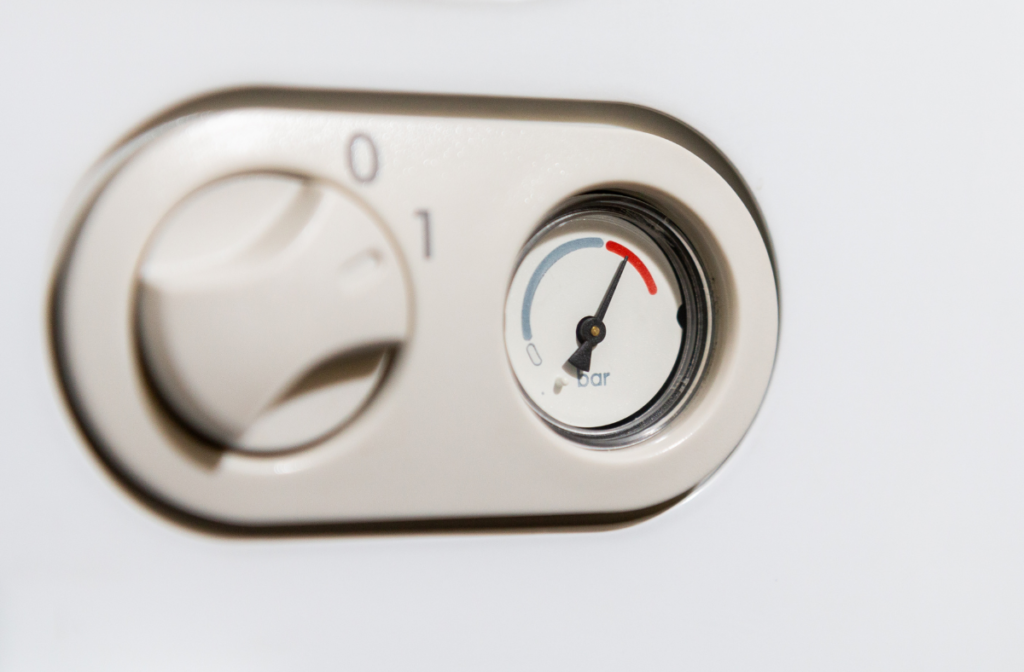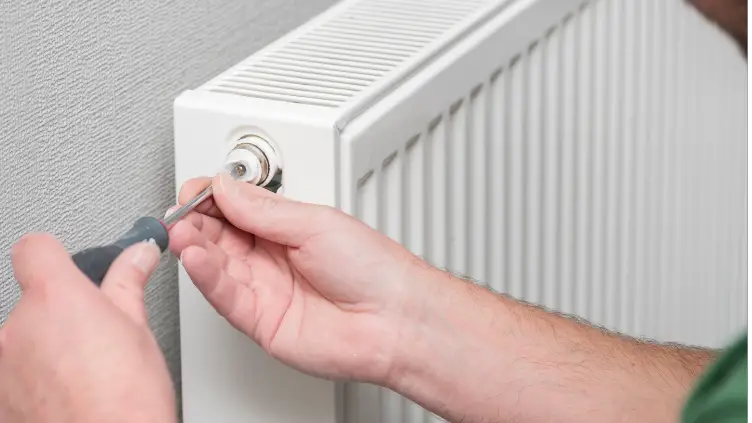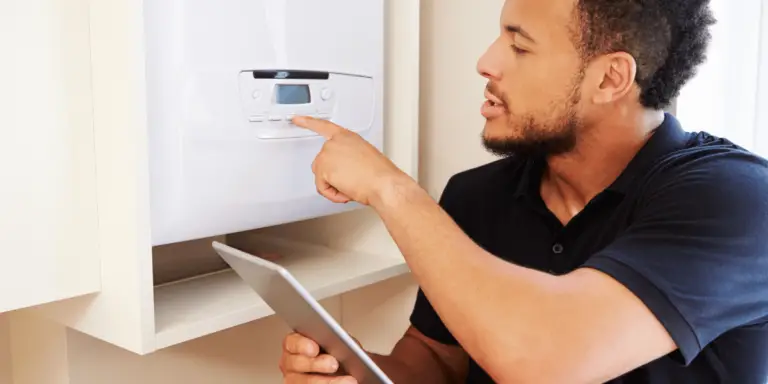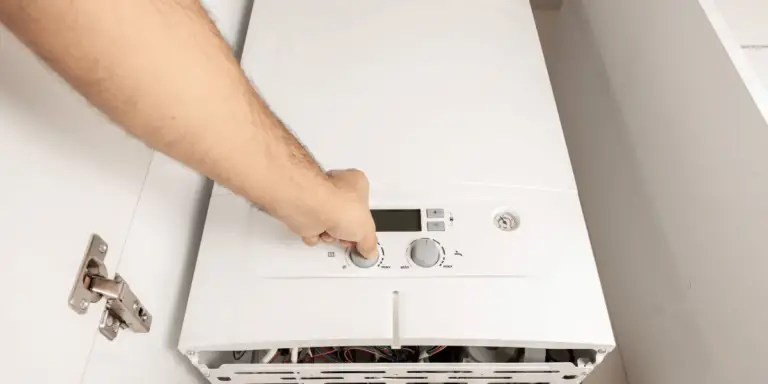What’s the ideal boiler pressure?
The ideal boiler pressure for a typical residential boiler should be between 1 and 2 bars when the system is cool. When the heating system is in operation (i.e., when the boiler is heating your home), the pressure may increase slightly, typically not exceeding 2.5 bars.
Boiler pressure can also vary based on the make and model of the boiler and the specific heating system in use, so you should always refer to the manufacturer’s instructions for the precise pressure levels for your specific boiler. If the pressure is too high or too low, it can indicate a problem with the system that may require professional attention.
Ideal pressure when the heating is on
When the heating is on, the ideal pressure for your boiler should typically be between 1.5-2.5 bars. This range ensures efficient heating and allows the system to operate properly. The boiler pressure should ideally be within the green range on the pressure gauge, which is typically marked to indicate the ideal pressure for the heating system.
It is important to note that the boiler pressure will naturally increase as the water heats up, and this is normal. However, it should not exceed the recommended range. If the pressure goes too high, it can lead to leaks and potential damage to the system.
To ensure the ideal pressure, it is recommended to regularly check the boiler pressure, especially when the heating is in use. This simple maintenance step will help you enjoy the efficient and reliable operation of your heating system.
Ideal pressure when the heating is off
When the heating is off, the ideal boiler pressure should still be within the normal range of 1-2 bars.
This is important because if the pressure drops too low, it can lead to a loss of heating and hot water, as well as cold radiators. To maintain the ideal pressure when the heating is off, it is recommended to periodically check the pressure gauge and make adjustments if necessary.
If the pressure is too low, you can use the filling loop or keyless filler to increase it. However, if you notice rapid or repeated pressure changes, it’s best to call a professional to diagnose and fix any underlying issues.
By keeping the ideal pressure when the heating is off, you can ensure that your system is ready to provide warmth and comfort when you need it.
How to check boiler pressure
To check your boiler pressure, simply locate the pressure gauge on your boiler. It is usually marked in green, indicating the ideal pressure range.

Remember, boiler pressure is different from water pressure in taps or showers, so it’s important to check it regularly to ensure optimal performance.
Low Boiler pressure
If you’re experiencing low boiler pressure, there could be a few possible causes…
Causes of low pressure
Low pressure in a boiler can occur due to leaks or bleeding radiators, resulting in no heating or hot water and cold radiators. When there is a leak in the system, the boiler’s pressure can drop. This can happen if there is a damaged pipe or a faulty valve.
Additionally, when radiators are bled to remove trapped air, the pressure in the boiler can also decrease. It is important to note that low boiler pressure does not pose any immediate danger, but it can affect the performance of the heating system.
To resolve this issue, you can use the filling loop or keyless filler to increase the boiler pressure. Following the manufacturer’s instructions, you can safely top up the water and restore the desired pressure.
Risks of low pressure
Low pressure can lead to a lack of heating and hot water, as well as cold radiators. However, it is important to note that low boiler pressure is not dangerous in itself. Instead, it can indicate underlying issues such as leaks or bleeding radiators.
How to increase boiler pressure
To increase the pressure of your heating system, follow these steps:
1. Turn off the boiler.
2. Locate the filling loop, typically a silver flexible hose connected to the boiler.
3. Open the valves on the filling loop.
4. Watch the pressure gauge as water is forced into the system, you should see it slowly rising.
5. Close the valves once the pressure reaches the desired level, usually between 1-2 bars.
Remember not to overfill the boiler, as this can cause damage. If the pressure relief valve continuously releases water, it may indicate a problem with the expansion vessel or the pipework. In such cases, it is recommended to seek professional assistance.
High boiler pressure
If you’re experiencing high boiler pressure, it’s important to understand the causes, risks, and how to reduce it.
Causes of high pressure
One common cause is a faulty pressure gauge. If the gauge is not accurately measuring the pressure, it may show a higher reading than the actual boiler pressure.
Another cause of high pressure is a rapid rise in temperature. When the water in the boiler heats up too quickly, it can cause the pressure to rise rapidly.
A malfunctioning pressure release valve can also be a culprit. If this valve is not functioning properly, it may not release excess pressure, leading to a build-up in the boiler.
Risks of high pressure
Understanding the risks associated with high pressure is crucial for the safety and efficiency of your heating system. High pressure can strain the various components of your boiler, potentially causing leaks and damage. This can result in costly repairs and decreased performance.
Excess water in the system can also stress the pressure relief valve, which is designed to release water when pressure becomes too high. If the valve fails to function properly, it could lead to a dangerous situation such as a boiler explosion.
To prevent these risks, it’s important to promptly address high pressure issues by calling a professional for boiler repair.
How to reduce boiler pressure
To effectively address high pressure concerns, it’s essential to take proactive measures in order to safeguard the performance and safety of your heating system. If you’re experiencing a boiler pressure issue, the first step is to turn off the boiler to prevent further pressure build-up.

Bleeding your radiators is a great way to release some of the pressure that has built up within the central heating system. Simply take a bleed key and work your way around the radiators in your home, making sure to release enough air until water reaches the bleed valve, this means that you’ve released all of the trapped air from inside the unit.
If the pressure continues to rise, it’s important to call a professional for a boiler repair. They will be able to diagnose and fix any underlying issues causing the high pressure.
Remember, it’s crucial to address high pressure promptly to prevent any potential damage to your heating system.
Conclusion
To ensure efficient heating, it’s crucial to maintain the correct boiler pressure. Checking the boiler pressure regularly is important because it can affect system performance.
High boiler pressure can lead to leaks, while low pressure can result in no heating or hot water. If you notice high pressure, it’s recommended to turn off the boiler and bleed the radiators to reduce it. On the other hand, if you have low pressure, you can use the filling loop to increase it.
If the pressure continues to rise or drop rapidly, it’s best to seek professional assistance. Remember, the normal range for boiler pressure is between 1-2 bars.






